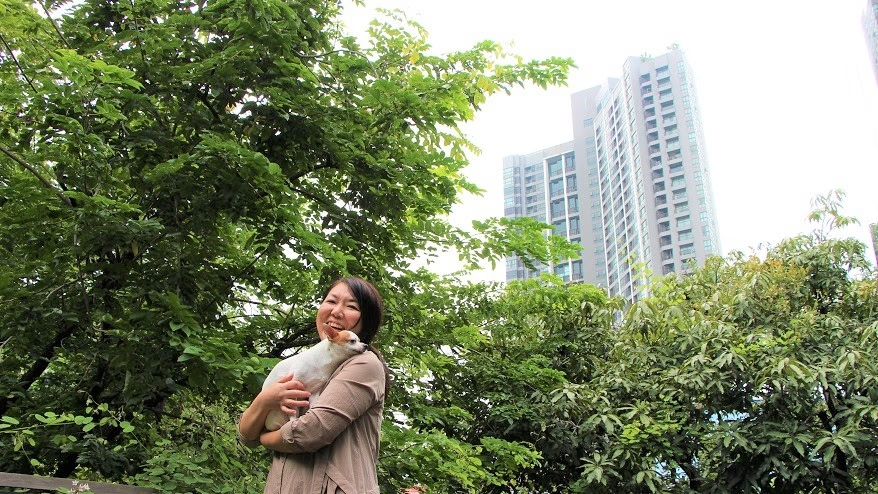こんにちは。京都在住のライター・杉本です。
コロナ禍が始まった頃、パスポートの期限が切れたまま……。私の体は京都に足止めされたままですが、以前にはなかった海外在住の方へのオンライン取材が増えている今日この頃です。
今回は、ものさすサイトでも海外へ! モノタイこと、モノサス・タイランドのWebディレクター 日向由紀さんにお話を伺いました。
「自由と責任 みんなの制度と働き方実験室」は、フルフレックス制度導入から4年目、フルリモート2年目を迎えたモノサスのメンバーに、それぞれの自律したワークスタイルのあり方、「会社」という場に対する意識変化を聞く連載です。
モノタイはフルフレックス制度を導入していませんが、コロナ下ではフルリモートに移行しています。モノタイならではのフルリモートの難しさ、そして日向さんのコーディング愛まで、ものさすサイト事務局の齊藤あかねさんと一緒にじっくり聞かせていただきました。
人生の一大転機に“憧れ”だったモノサスへ
杉本:日向さんは、ものさすサイトに初登場。モノタイに入社した当時のことから聞いてみたいと思います。
日向:2018年11月、現地採用入社です。タイには2013年夏に、当時のパートナーと一緒に移住しました。もともと東京のWeb制作会社で働いていて、移住後はフリーランスで主にWebコーディングの仕事をしていました。ひとりで暮らすことが決まったとき、帰国も考えたんですけど、タイに住み続けるほうがストレスが少ないんじゃないかと思って就職活動をしたんです。
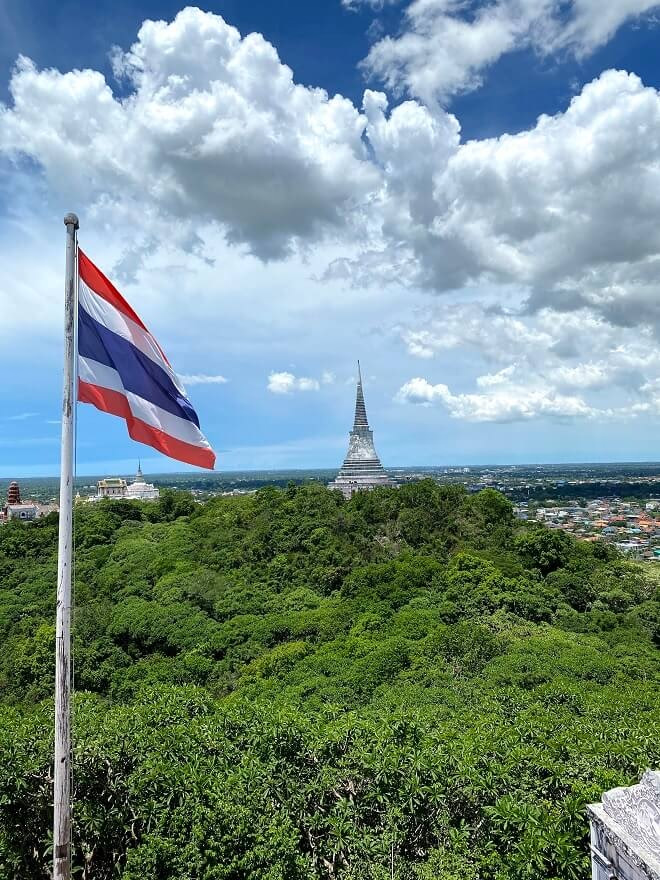
杉本:なぜ、モノタイに応募しようと思ったのか覚えていますか?
日向:モノサスのことは、東京にいた頃から雑誌連載を読んだり、セミナーに参加したりしていたので、いい会社だなと思っていたんですね。モノタイができたことも知っていたのですが、モノサスのみんなはキラキラしていてまぶしく思えて。「私には入り込めないんじゃないか」という感じがあったんです。でも「日本に帰るか、タイに残るか?」となったときに、ちょっと腹をくくって憧れの会社を受けてみようと思って。社員募集はしていなかったけど「もしよかったら」と連絡をして、採用してもらいました。
杉本:モノサスのどういうところを見て「いい会社だ」と思ったのでしょう。
日向:見ていたのは、主にCF(コーディング・ファクトリー)ですね。しっかりしたコーディングのガイドラインやチェック・チームがあるところに、コーディングに誇りをもつ職人気質を感じて「かっこいいな」と憧れていました。
杉本:つまり、人生の一大転機に思い切って憧れの会社のドアを叩いたんですね。
日向:一か八か、みたいな感じでした。あのとき勇気を出してよかったと思っています。
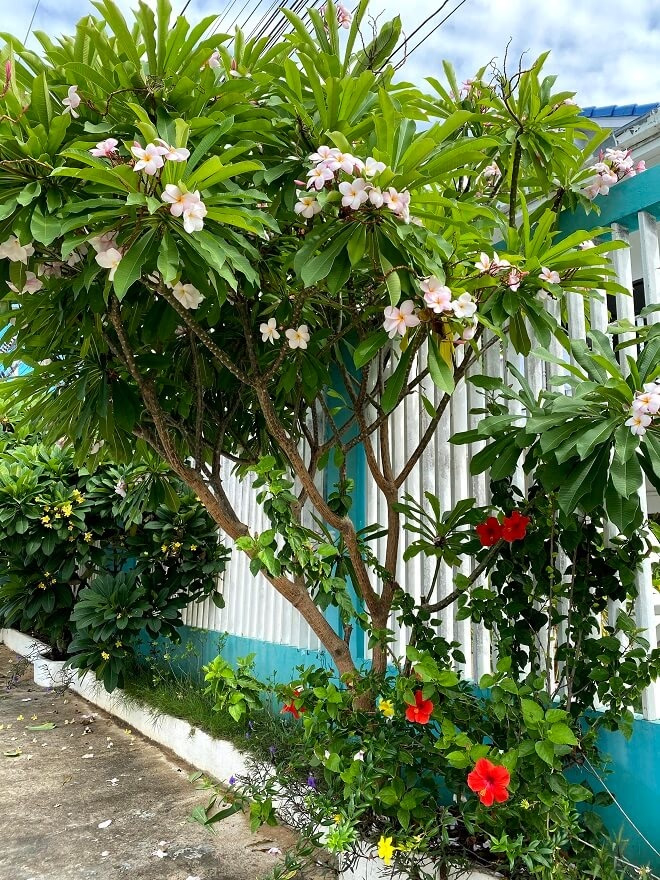
タイのコーダーさんは「まじめだし、やさしいし、がまんづよい」
杉本:入社してみて、モノタイはどんな感じでしたか?
日向:なんでなんだろう?っていうくらい、イヤなことが全然ないんですよ。タイの会社で働く知人たちには、「タイ人はわがままで、すぐに辞めちゃう」という話をよく聞くんですけど、モノタイのみんなはすごくまじめだし、やさしいし、がまんづよい。すごくちゃんとしていて尊敬しています。
社内の雰囲気もすごくよくて。いつも誰かが笑っていて、ギスギスした感じがまったくない。仕事自体は大変なこともあるけれど、雰囲気の良さに助けられているかもしれません。
杉本:あかねちゃん、なんか思うところある表情ですが、ひとこといかがですか?
齊藤:はい。すごいびっくりというか。モノタイの方たちはすごく忙しいイメージがあるので、「心荒んで仕事されているのでは?」なんて勝手に思っていたんですけど、いつも誰かが笑っているって……。そういう雰囲気だったのかと思いました。
日向:今の仕事はWebディレクターなので、日本のお客さんから依頼を受けて、要件を噛み砕いてタイのコーダーさんに指示を出しています。ときには無理難題を言うときもあるから、私がコーダーだったときには、「このデザインは難しいな」とイライラしたり、ディレクター個人に不満を感じることもあったと思うんですね。
でも、モノタイのコーダーさんたちは、「なんか今、日向ってディレクターがこんな仕事振ってきてさー」みたいに、仕事上の愚痴や不満を人間関係にもってこない。「仕事は仕事、同僚は同僚」って感じなんですよ。タイの方たちと働くようになって、見習わなきゃいけないなと思ったことのひとつですね。
杉本:「日本では残業当然だけど、ヨーロッパでは定時でビシッと帰る」とか、国や地域によって働き方の違いがあると思います。タイの働き方についてはどうですか?
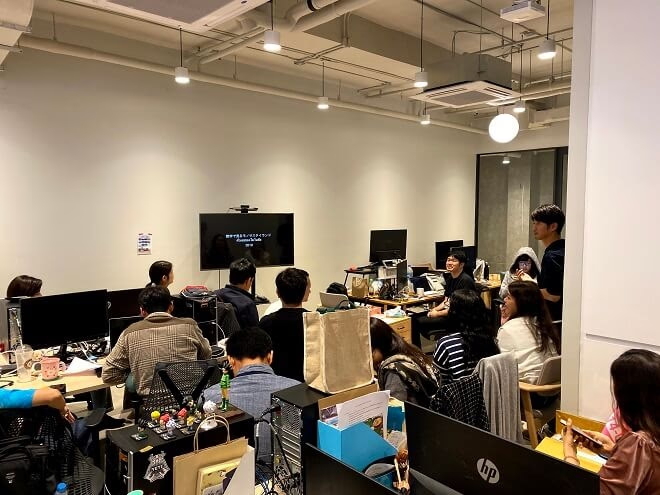
日向:私はモノタイのことしかわからないけど、みんな自分の仕事を責任をもって終わらせるので、できていないのに定時で帰るということはないですね。ただ、家族が一番大事なんだろうなと思います。「家族を病院に連れて行くから休みます」というのは普通にあります。日本だと「妻を病院に連れていくから休む」というのはなかなかないと思うのですが。
杉本:トラブルにはならないけど、文化の違いでびっくりするようなことはありますか?
日向:仕事をしている画面の端でYoutubeを再生していたり、昼休憩以外のおやつタイム?が長かったり……。テレワークの状況ではなく、オフィスで働いているときから、そんな感じです。遊んでいるように見えても、サボりすぎてクビになった子はいません。みんな仕事はちゃんとしているんですよね。
タイに住み始めた頃にびっくりしたのは、コンビニやデパートの店員がスマホをずっと見たりしていることでした。私はそういう感じに慣れちゃっていたから、モノタイのみんなが少々自由に振舞っていても、あまり驚きはなかったのかもしれません。
フルリモート以前にはもう戻れないかもしれない
杉本:いま、タイはどんな状況なんですか?
日向:飲食店でお酒が飲めなくて、マッサージ店や美容院は開いていません。それ以外のお店は通常通りかな(注:8月現在は、食料品店とコンビニしか開いていないそうです)。感染状況によって、バンコク以外の県への移動を急に禁じられることはあります。帰国についてはそれほど難しくないのですが、タイに戻るときいろんな書類が必要になるので、前みたいに気軽に日本には帰れないですね。
杉本:コロナ禍以降は、モノタイもフルリモートに移行していますね。
日向:出社日も設けられていないし、全然オフィスには行っていないですね。せっかく会社に入ってみんなで仕事をするのが楽しかったのに、またひとりになっちゃったのは寂しいです。感染状況が落ち着いたら、みんなに会いたいからたまには出社したいと思っています。
ただ、タイの人たちは、今の働き方のほうがいいと思っている人が大半だと思いますね。オフィスから遠い実家で暮らしていて、通勤に2時間かかる人もいるので。たぶん前みたいに毎日オフィスで仕事をするのは難しくなっちゃっているかもしれません。
杉本:日向さんの働き方はどう変化していますか?
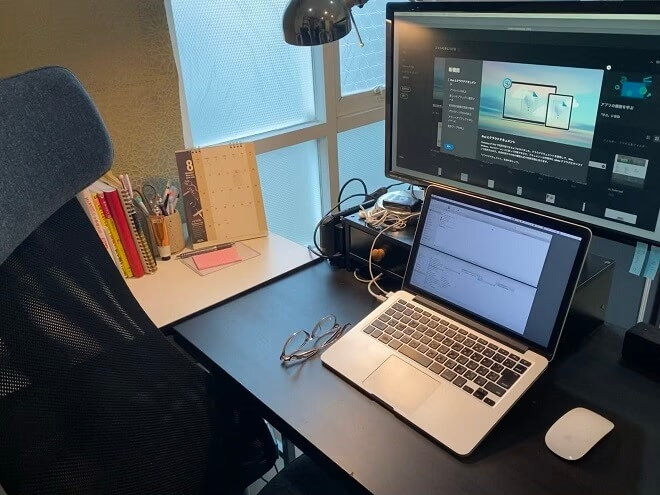
日向:定時通り9時から18時まで仕事しています。もともと在宅で仕事をしていたので、仕事環境は整っていますし、生産性的にはオフィスで働いているときと変わらないと思います。むしろ今のほうが、仕事に集中できる時間が増えて捗っているかもしれない。
杉本:リモートでタイのメンバーと仕事するうえで、難しさを感じることはありませんか?
日向:オフィスで一緒に働いていたときは、ジェスチャーや表情などで伝えられたし、つたない言葉でも画面を見せながら話せば伝わっていたと思うんです。リモートになってからは、些細なことでも通訳さんを入れないと通じなくなっちゃって。最初は特に難しかったですね。
仕事を振るときも、常にみんなやさしい笑顔で受け止めてくれるとわかっていても、チャットだと表情や感情までは伝わってこないから、「どう思っているかな?」と気になってしまいます。日本語なら言葉のニュアンスや、「!」とか絵文字を使って、テキストでも感情を伝えられるじゃないですか。でも、私が使う英語ではそこまで表現力を出せないし、コミュニケーションのキャッチボールは難しいなと思っています。
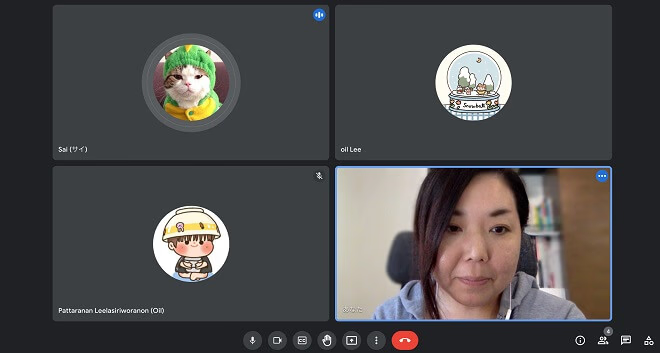
料理とコーディングの共通点は「ビシッと決まる」
杉本:せっかくなので、日向さんご自身についても聞いてみたいと思います。なぜこの業界に入ったんですか?
日向:実は私、もともと学生のときは栄養士になる勉強をして、5年くらい栄養士としてある社員食堂を切り盛りしていました。
杉本:なんと、意外な経歴ですね。
日向:ところが、勤め先の社員食堂の仕事がなくなってしまったので、そのタイミングで新しいことをやろうと思って、ハローワークの職業訓練でHTMLの勉強をしました。そしたら、すごく面白くてハマってしまって(笑)。
その後、アルバイトとして勉強しながらコーディングの仕事を始めたのですが、毎日新しいことを覚えるのが楽しくて。通勤電車のなかでは本で勉強をして、家で手を動かしてみて。自分がつくったものが画面に立ち上がり、ウェブで公開されてみんなが見るなんてすごい!感動!みたいな。コーディングがすごい好きになっちゃったんです。
杉本:さっき、「CFの職人気質なところがかっこいい」と言われるのを聞いて、「お好きなんですね、コーディング!」と思ったんですけど、そこまでハマっておられたとは……。
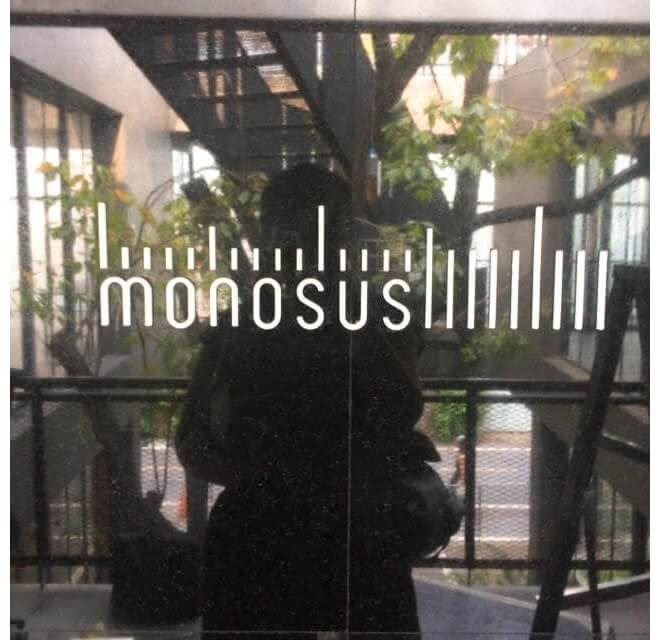
日向:私がWeb業界に入った頃は、まだデザイナーとコーダーの仕事が明確に分けられていませんでした。でも、CFはコーディングだけに全集中して、そこを完璧にやろうとするところがすごいなと思って。それから「私はデザインはやらなくていい。コーディングをがんばろう」と切り替えることができたんです。
なぜ、デザインではなくコーディングだったのかというと、「こうやってビシッとやったら決まる」みたいな気持ち良さがあったからだと思います。CFのようにガイドラインがしっかりあれば、作業主が違っても同レベルのものができる。手順があって、完成に向かっていくところが好きなのかもしれない。
料理も同じで、材料を揃えて下ごしらえをして、料理が完成して食べてもらって終わり、という流れがあります。コーディングにも同じ気持ち良さを感じるんですよね。「コーダーあるある」だと思うのですが、本当にコーディングにハマっていたときは、ランナーズハイみたいな状態になれました。集中するのが気持ちいい、パズルしているみたいな楽しさがあるというか。
オンラインでもモノタイの“仲間意識”を高められたら
杉本:これからお仕事のなかでやってみたいことはありますか?
日向:まずは、モノサスに入ってはじめてディレクターの立場で仕事をさせていただいているので、みんなが気持ちよく動けるようにもっと進行管理のコントロールをうまくできたらいいなということがあります。
もうひとつやってみたいのは、フルリモートで仕事をしていても「みんな同じ会社の仲間なんだぞー」と実感できる機会を増やせたらいいなと思っています。たとえば、元気がなさそうな子が社内にいても、今だと顔を合わせないのでわからなくて。そのへんをなんとかしたいなと思っています。
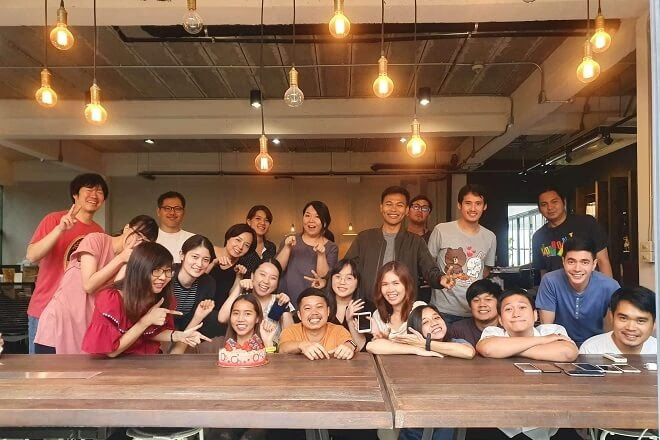
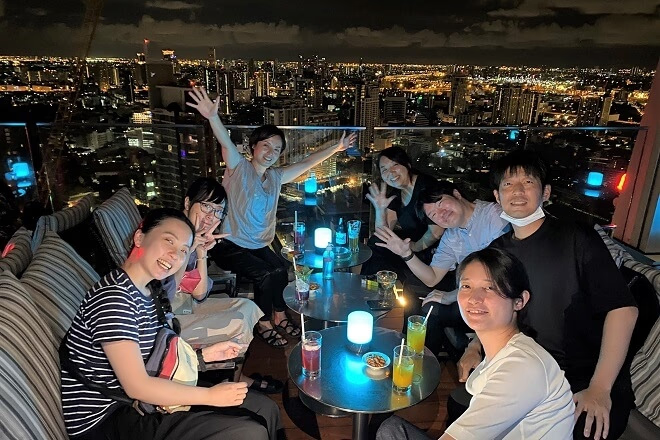
和気藹々とした雰囲気のモノタイスタッフ、たのしそう!
杉本:代々木オフィスは、離れていてもどうやってコミュニケーションをつくろうとしているのかを情報共有してもいいかもですね。
日向:この間、GoogleKeepで情報シェアしようという話もあったので、みんなで共有できる場所がWeb上にあるといいのかなと思っているんですよね。たとえば「今までみんなが見ていたYouTubeはなんだったの?」みたいなことでもいいし(笑)。オフィスにいたときみたいに、無駄だと思えるような情報の共有もできたらいいなと思います。
杉本:最後に、ご一緒してくださったあかねちゃんの感想を聞いてみたいです。
齊藤:こうやってモノサスの人たちのお話を聞いていると、やっぱり自分の責任と楽しみをもって仕事をしているので、同じ会社の人たちなんだけど憧れるんですよね。「こんな風に仕事をする人がいるんだ」って。
日向:私も、モノサスの人たちみんなにそう思っています。みんなちゃんと考えて生きているなあって。私は、本当に流されているような人生なので。「自分と責任」という言葉で言えば、自分の状況や「こういう風に生きている」みたいなことについては、「自分のことだし」みたいなところはあるんですけど。計画的に人生を設計することは、若い時からまったくしていなかったので、好きな方に流されていったらここにいた、みたいな感じですね(笑)。
杉本:私は今も、自分の人生をちゃんと考えられている自信ないです! 日向さん、あかねちゃん、ありがとうございました!
あかねちゃんが言ってくれたように、モノサスの人たちは自分の仕事に誇りをもちながら、モノサスという会社にいる意味をちゃんと考えていて。本人たちは「えー?別に……」と言われそうだけど、やっぱりかっこいいなと思います。たぶん、日々の忙しさのなかでは、お互いの仕事観を語り合う機会はあまりないかもしれません。だからこそ、ものさすサイトのインタビューで、みなさんの考えを伝え合うお手伝いができていたらうれしいです。
「自由と責任2020」に登場してくださったみなさん、読んでくれたみなさん、サポートしてくれたあかねちゃんときみちゃん、本当にありがとうございました!
